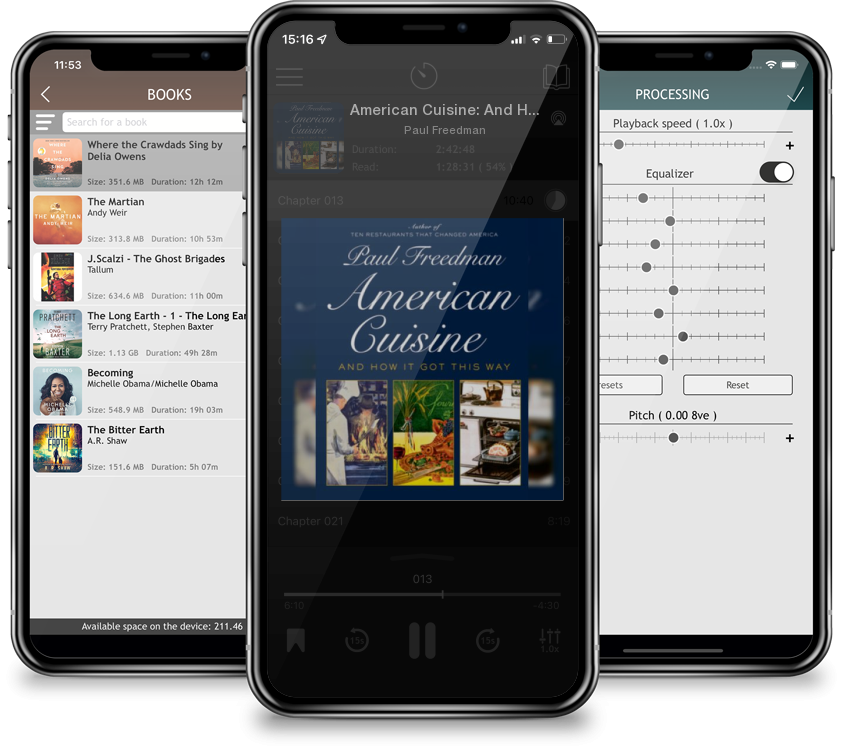Listen to American Cuisine: And How It Got This Way by Paul Freedman
Enjoy this audiobook with MP3 Audiobook Player - the ultimate iOS audiobook experience


With an ambitious sweep over two hundred years, Paul Freedman's lavishly illustrated history shows that there actually is an American cuisine. For centuries, skeptical foreigners-and even millions of Americans-have believed there was no such thing as American cuisine. In recent decades, hamburgers, hot dogs, and pizza have been thought to define the nation's palate. Not so, says food historian Paul Freedman, who demonstrates that there is an exuberant and diverse, if not always coherent, American cuisine that reflects the history of the nation itself. Combining historical rigor and culinary passion, Freedman underscores three recurrent themes-regionality, standardization, and variety-that shape a completely novel history of the United States. From the colonial period until after the Civil War, there was a patchwork of regional cooking styles that produced local standouts, such as gumbo from southern Louisiana, or clam chowder from New England. Later, this kind of regional identity was manipulated for historical effect, as in Southern cookbooks that mythologized gracious "plantation hospitality," rendering invisible the African Americans who originated much of the region's food. As the industrial revolution produced rapid changes in every sphere of life, the American palate dramatically shifted from local to processed. A new urban class clamored for convenient, modern meals and the freshness of regional cuisine disappeared, replaced by packaged and standardized products-such as canned peas, baloney, sliced white bread, and jarred baby food. By the early twentieth century, the era of homogenized American food was in full swing. Bolstered by nutrition "experts," marketing consultants, and advertising executives, food companies convinced consumers that industrial food tasted fine and, more importantly, was convenient and nutritious. No group was more susceptible to the blandishments of advertisers than women, who were made feel that their husbands might stray if not satisfied with the meals provided at home. On the other hand, men wanted women to be svelte, sporty companions, not kitchen drudges. The solution companies offered was time-saving recipes using modern processed helpers. Men supposedly liked hearty food, while women were portrayed as fond of fussy, "dainty," colorful, but tasteless dishes-tuna salad sandwiches, multicolored Jell-O, or artificial crab toppings. The 1970s saw the zenith of processed-food hegemony, but also the beginning of a food revolution in California. What became known as New American cuisine rejected the blandness of standardized food in favor of the actual taste and pleasure that seasonal, locally grown products provided. The result was a farm-to-table trend that continues to dominate. "A book to be savored" (Stephen Aron), American Cuisine is also a repository of anecdotes that will delight food lovers: how dry cereal was created by William Kellogg for people with digestive and low-energy problems; that chicken Parmesan, the beloved Italian favorite, is actually an American invention; and that Florida Key lime pie goes back only to the 1940s and was based on a recipe developed by Borden's condensed milk. More emphatically, Freedman shows that American cuisine would be nowhere without the constant influx of immigrants, who have popularized everything from tacos to sushi rolls. "Impeccably researched, intellectually satisfying, and hugely readable" (Simon Majumdar), American Cuisine is a landmark work that sheds astonishing light on a history most of us thought we never had.
💼 Boosting productivity at work with an audiobook in the background – love it! 💻🎧 ⭐️ Kudos to the developers for creating an app that's both functional and user-friendly. I can navigate and enjoy my books effortlessly. 📚👏 CarPlay compatibility is a fantastic addition. It enhances my driving experience with seamless audiobook integration. ListenBook Pro's noise reduction ensures that my listening experience remains clear and enjoyable.
The ability to adjust the playback speed has made my commute even more efficient. ListenBook's interface is sleek and user-friendly, making navigation a breeze. This app has become my ultimate travel companion, ensuring that I'm always entertained and inspired. No need to convert files anymore – ListenBook's seamless playback of various formats is a game-changer for audiobook enthusiasts like me! The ability to adjust playback speed and volume is a game-changer for me.
ListenBook has transformed my daily commute. I look forward to my journeys with this app by my side. No more converting files – this app effortlessly handles various formats, saving me time and effort.
I'm impressed by ListenBook's commitment to providing a silky-smooth playback experience. This app's versatility and convenience have transformed my screen time into a productive reading journey. Streamlining audiobook enjoyment – this app's functionality is truly impressive.
With this app, I've turned mundane chores into exciting opportunities for intellectual growth. ListenBook's noise reduction feature in the Pro version is a testament to the app's commitment to audio quality. I'm amazed by the extensive statistics tracking. It's fascinating to see my listening habits. Looping playback is a game-changer for my study sessions. It helps me absorb information more effectively. Playback speed and volume controls are top-notch. Highly recommend.
This app has reignited my passion for literature – I'm devouring books like never before. ListenBook's support for CarPlay and Apple Watch is a game-changer for my on-the-go listening. Thanks to ListenBook, downloading audiobooks has never been easier or more convenient. Adjusting the tone of the voice is so innovative. It's like personalizing the narration.
Plays MP3, MP4, OPUS, OGG, FLAC, AWB, M4B, M4A, WMA, AAC formats
Optimized for iPhone, iPad, and iPod with seamless integration
Adjust playback speed from 0.5x to 3.0x for your listening preference
Import audiobooks via iTunes, cloud services, or direct downloads
Get your favorite audiobooks in supported formats from various sources
Import audiobooks to MP3 Audiobook Player using multiple methods
Control playback from your device, headphones, Apple Watch, or CarPlay
Join thousands of users who enjoy audiobooks with MP3 Audiobook Player daily
Download Now